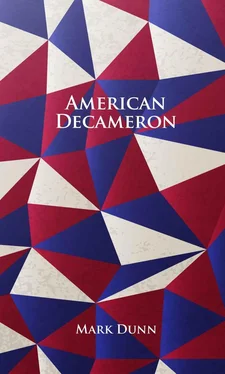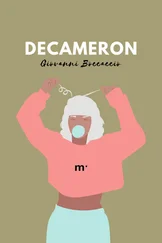As the two women were making their way toward the front door at the end of the evening, Leonora said, as she always did, “Goodbye, Meshak.” Then she said, “Nancy, may I pet him?”
“I don’t think he’d mind. He didn’t seem to mind last week.”
Leonora held out her hand so that Nancy could take it and place it in the vicinity of the bird. Leonora felt for the feathers and then suddenly took gouging hold. She yanked the stuffed parrot from its perch and threw it to the floor. Then she stomped all over the floor, hoping to trample it.
There was a long, deadly silence. Then Leonora said, “It looks like I’ve killed your goddamned bird.”
Another silence. Then: “You can’t kill me that easy, you crazy blind bitch.”
Leonora went home unescorted that night.
1952 DOUBLY UXORICIDAL IN COLORADO
I’m not sure if it was Charlie who saw Bob first, or Bob who spotted Charlie. It probably doesn’t matter. It wouldn’t have been long after sitting themselves down at separate tables in the dining room of the Golden Lantern for each man to have gotten squarely into the other one’s line of vision, and neither man was simply going to ignore what he saw. Fate required that the two should meet. Fate and their own impetuous and curious natures. Because it isn’t every day you chance upon someone who looks exactly like you.
Neither man had been to Denver before. Charlie was there to meet with owners of a small company that was preparing to bring out their own automatic ranch gate. Charlie managed a construction supply company in Brooklyn — a company that didn’t want to get left behind in the automatic ranch gate boom. Bob was a freelance photographer who was just wrapping up a trip to the Colorado Rockies. He’d been taking nature shots for an iron lung-bound artist colleague who’d grown tired of painting objects in his room.
Let’s say that it was Charlie who made the initial approach. Let’s say that before he’d even placed his order with the waitress, he got up from his seat and crossed to Bob’s table on his own initiative. (Both were dining alone.) Without saying a word, Charlie, let’s say, sat down and the two took themselves a long silent moment to fully digest what each was seeing — to completely dismiss the possibility of hallucination.
Even though Charlie may or may not have made the first move, it was Bob who broke the ice with the following observation: “Mom told me about you. I never quite believed her until now.”
“What are you talking about?”
“My mother. My adopted mother. She sat me down one day. I was a pretty big boy at the time — maybe twenty-two. She told me that there was something she’d never told me before — something about my adoption. I had a twin, you see. Our birth mother put us both up for adoption before she croaked from whatever street drugs had eaten that big hole in her brain. Why my adopted mother told me this, I don’t know. I really had no desire to go looking for you. I knew the odds were slim that I’d be able to find you, even if you really existed. Who knew that dumb luck would do all the work for me?”
“So you think we’re twins?”
“Can it be anything else? Separated at birth, my friend. Why? I don’t know. It would have been nice to have had a brother all those years.”
Another silence passed, each man studying the face of his biological mirror image. Finally, Charlie reached out his hand and said, “I’m Charlie. Charlie Towers.”
And Bob took the hand and said, “Bob Fletcher.”
And then the waitress interrupted to ask if Charlie would be returning to his table, and Charlie said no. “I didn’t think so,” replied the waitress. “What happened? You two brothers have a fight and now you’re making up?”
Bob didn’t answer. Charlie smiled. “Making up. Yeah, that’s it. My brother and I are making up…for lost time.”
Bob handed the waitress his menu. “I’ll start with the Seafood Louis cocktail and the apple-marshmallow salad — whatever the heck that is. Then give me the pork tenderloin with the whipped potatoes.”
The waitress shook her head. “No potatoes.”
“It’s on the menu.”
“Well, there still aren’t any spuds to be had, so I’d recommend the buttered new peas and the creamed coleslaw. You get double vegetables without the potatoes.”
Bob sighed. “I miss potatoes.”
Charlie nodded. “Me too. But look on the bright side: they say the shortage will be over when the new crop comes in. This isn’t the Irish potato famine we’re talking about here… brother .”
As Bob was left to consider the marvelous implications of that wonderful word, Charlie placed his order and the waitress disappeared and the two long-lost siblings got down to brass tacks. Bob didn’t know much more than what he’d already said. Charlie didn’t know anything at all. The two thirty-five-year-old brothers, both a little guarded with one another initially, soon began to relax, soon began to open themselves up to discovering how very different they were in terms of the life paths they’d chosen for themselves, but also how very similar certain aspects of their lives had turned out to be.
Both men, for example, had insufferable wives — grasping harridans (their own words) who refused to grant their longsuffering husbands divorces out of spite, or rather because of the presence of the prettier, newer, much less insufferable model who waited impatiently and amatively in the wings.
“I’ve been thinking a lot about that Hitchcock picture that came out last year: Strangers on a Train ,” said Bob. “How convenient it would be to find some stranger to do in the little woman. Now just what if the stranger you happen to meet ends up being your very own identical twin brother? What an additional convenience that would be!”
“How do you mean?” asked Charlie, digging his spoon into the syrup-glazed mound that was his butterscotch sundae. “I mean, how’s that going to work — the stranger I get to kill my wife looks just like me? Would you consider this one of your better ideas?”
“Wait, hear me out. Say, let’s blow this place. Where are you staying?”
“The Brown Palace.”
“Good. We’ll go there. I’m at a bedbug motor court on 85.”
The two men went to the Brown Palace. They held up in Charlie’s room in the company of a fellow named Jack Daniel who had long been a friend to them both.
For the first three hours of that long, sleepless night, the men traded stories from their own lives — from the life of the twin who was the shrewd and calculating businessman with hopes of some day taking over his uncle’s construction supply house, and from the life of the artist with a camera who created works of beauty on Kodak paper when he wasn’t taking incriminating snapshots of adulterous spouses and their future divorce court corespondents.
The rest of the night was spent plotting the murders of the women who held them back — the women who carped and whined and pinioned their husbands unmercifully.
Because what had started out as mere whim had, in that long night, transformed itself first into distinct possibility and then into glorious reality.
The key element in the planning was the creation of high-profile, indisputable alibis for each of the two brothers. Just as it was proposed by the character of Bruno in Strangers on a Train , each man would be committing the other man’s murder. (Under some sort of disguise, of course, bowing to the slim possibility that one or both of the brothers might be seen going to or coming from the scene of the crime.) But here was the beauty of the entire setup: each brother would be quite some distance from his wife at the time of her murder, with a perfectly engineered and strongly corroborative alibi.
Читать дальше












